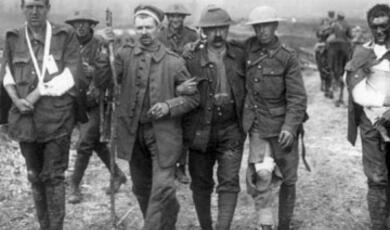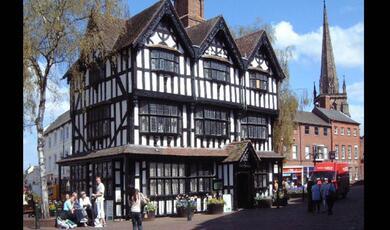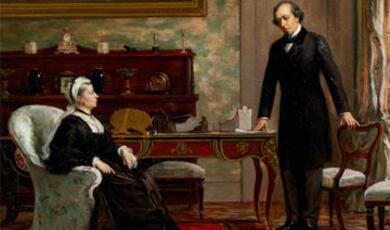Leadership and Change: Prime Ministers in the Post-War World - Winston Churchill
Share
- Details
- Transcript
- Audio
- Downloads
- Extra Reading
Vernon Bogdanor CBE FBA, Gresham Professor of Law
Response by Philip Ziegler
Download Transcript
Leadership and Change: Prime Ministers in the post-war world: Winston Churchill
Professor Vernon Bogdanor
1. Churchill is unique amongst post- war Prime Ministers, since he is the only Prime Minister whose post-war career was an EPILOGUE to his main achievement. His reputation was already been secure. For, it seemed that, in the 1930s, he, almost alone, had been right about Hitler when everyone else had been wrong; and he had saved his country in 1940. He could not on his own defeat Hitler, but, by ensuring that Britain was not defeated, he could ensure that Nazi Germany did not win the war.
2. In 1940, Churchill told Anthony Eden, already his likely successor, that he would not make Lloyd George’s mistake by staying on after the war, but would retire when the war came to an end. No doubt the history of post-war Britain would have been very different if he had stuck to that resolution. For the fundamental question that needs to be asked is whether he had anything positive to contribute after 1945. Was his peacetime premiership a mere anticlimax to his great achievements during the war?
3. Churchill became Premier for the second time in 1951. He came to his peacetime premiership with a greater length of experience than any other Prime Minister in the 20th century. Most Prime Ministers have been in the Commons for around 20 to 30 years before entering Downing Street. Churchill had been an MP for over fifty years, having first entered Parliament in 1900. He had first become a Cabinet minister in 1908
4. It is said that our political views are formed in our early years and that we do not change our basic assumptions once we reach maturity.
What, then, were the basic assumptions of Churchill’s youth which, we must remember, were spent in Victorian times, over 50 years before his peacetime premiership.
The FIRST was that Britain was a great power, perhaps the leading power in the world. What Britain did mattered. Britain led and others followed.
The SECOND was that British power depended upon her being at the centre of a great Empire, covering around one-quarter of the world’s surface and around one-fifth of the world’s population – the largest Empire, indeed, that the world had ever seen. This Empire comprised three parts. First, there were the colonies of settlement, such as Australia, Canada and New Zealand, colonies which were either self-governing by 1900, or well on the way to self-government. Second, there were the dependent colonies, primarily composed of non-white people, in Africa and Asia. Few people even on the radical left believed, in 1900, that these dependent colonies would be ready for self-government for a long time, if ever. Third there was the vast Indian Empire which, again, few believed would be ready for self-government for many years.
Indeed, until 1939, most members of the political class in Britain, and in other countries also, believed that self- government was for white people only. That was why Churchill, in the post-war period, was so hostile to giving independence to the Sudan, to removing British troops from Egypt, and, above all, to giving independence of India. Indeed, India is, I think, the one great country in which Churchill is not regarded as a hero. At any rate, there can be no doubt that Churchill did not appreciate the forces of colonial self-determination which were to prove so powerful after the Second World War. His last known political utterance was to express disapproval of Harold Macmillan’s `Wind of Change’ speech in South Africa. He was, to this extent at least, a child of his time.
5. Yet, although Britain, at the beginning of the 20th century lay at the centre of a world –wide empire, there were already fears that this empire was under threat, from the rising empires of Germany, Russia and Japan, and the growing industrial power of the United States. During Churchill’s youth, therefore, there were moves, led by Joseph Chamberlain, to strengthen the Empire by adopting a policy of tariff protection, so that it could be sheltered from the commercial competition of these growing empires. The future, Chamberlain believed, was for great empires and not for little states. A small island could not on its own compete; and unless drastic action were taken, the self-governing Empire would rapidly be undermined by the centrifugal tendencies of colonial nationalism.
6. Churchill, although an Imperialist, disagreed with this assessment. He favoured a liberal
Empire – what we would now call a Commonwealth – of independent states
The main reason why Churchill was hostile to the Chamberlain view of an enclosed Empire is that he was a European as well as an Imperialist. He did not believe that Britain could be walled off from the rest of the Continent. On the contrary, British security and influence depended not only upon the Empire but also upon the balance of power in Europe.
Joseph Chamberlain, like his son Neville, who was Prime Minister from 1937 to 1940, and had to deal with Hitler’s territorial claims in Europe, tended to deprecate the value of a European commitment. What, after all, did local European squabbles matter when Britain was at the heart of a far-flung and world-wide Empire.
Neville Chamberlain famously spoke of Czechoslovakia in 1938 as `a far away country of which we know nothing’. Churchill could never have used such words.
During Churchill’s youth, at the end of the 19th century, people frequently spoke of the unity of European civilization. After 1914, however, that unity was destroyed by two totalitarian ideologies, Communism and National Socialism. It took almost the whole of the 20th century to overcome that tragic division. Churchill, oddly enough, saw what was to happen. He told his Private Secretary, Sir John Colville, in the early 1950s, that if he, Colville, lived to his `natural span’, he would see the end of Communism in Europe, since the Communists would be unable to digest what they had swallowed. Colville died in 1987, just two years before the fall of the Berlin wall.
Speaking at Aachen in 1956, Churchill had declared that the unity of Western Europe was desirable since only then would the states of Eastern Europe regain their independence. `The Europe we seek to unite’, he had said at Brussels in 1949, `is all Europe’.
7. This does not mean, of course, that Churchill was in favour, when he became Prime Minister, of Britain joining a supranational organization in Europe, such as the European Coal and Steel Community, forerunner of the Common Market, now the European Union. He was not in favour – or perhaps it might be fairer to say that he was not in favour in the circumstances of his time. However, one of his colleagues in his peacetime government – Edward Heath who has just died – has said that Churchill’s hostility to Britain’s involvement was a matter not of PRINCIPLE but of CIRCUMSTANCE; and that had Churchill appreciated that Britain would not remain an Imperial or a world power, he would, like de Gaulle in France, have perceived that the future lay with Europe.
That of course is a speculative question on which widely different views will be held.
But there is an even more important factor which prevented Churchill from accepting the view that Britain’s future lay with Europe. It was his view of Britain’s relations with the United States and the so-called `Special Relationship’.
(We must remember that Churchill’s mother was American – so also was Harold Macmillan’s mother)
In the 19th century, Bismarck, the German Chancellor had said, that the key feature of the 20th century would be that the Americans spoke English!
The years of Churchill’s political life – from 1900 to 1955 – were also the years when, at least in Britain’s eyes, the `special relationship’ was at its closest.
Churchill believed that a strong alliance between the United States and Britain could have prevented both world wars – an arguable proposition. He also believed in the post-war years that a strong alliance between the United States and Britain was the key to preserving world peace and preventing a third world war with Stalin’s Russia. Britain, because of her Empire, need not be a merely junior partner in that alliance. ` Britain’, Churchill told the French foreign minister in 1949, `cannot be thought of as a single state in isolation. She is the founder and centre of a world-wide Empire and Commonwealth’.
Churchill contrasted the firm stance taken by the United States and Britain in the post-war years, when Stalin was perhaps well prepared to take the sort of risks with peace that Hitler had taken in the 1930s, with the appeasement policies of the pre-war era.
But Churchill went even further. For he hoped for some sort of political union, ill-defined perhaps, between the Commonwealth and the United States. He wanted a union of the English-speaking peoples. In 1958, he concluded the fourth and final volume of his book, A History of the English-Speaking Peoples. with the words:
`The future is unknowable, but the past should give us hope.
Nor should we seek to define precisely the exact terms of ultimate union’.
(My emphasis)
This was of course quite unrealistic; and the Suez crisis of 1956, one year after Churchill’s retirement as Prime Minister, shows that the special relationship with the United States, if it existed at all, was the relationship of superior to subordinate. It could not be a relationship of equals.
The United States never took Churchill’s idea of a Union of English-Speaking Peoples seriously. In 1953, after Churchill’s visit to America and talks with Eisenhower, the President wrote in his diary.
`Winston is trying to relive the days of World War II’. He `had developed an almost childlike faith that all of the answers are to be found merely in British-American partnership’.
In 1954, the American Secretary of State, John Foster Dulles, after talks in London with Churchill, told President Eisenhower. `The Prime Minister followed his usual line. He said only the English-speaking peoples counted, that together they could rule the world’.
The Americans thought that Churchill was living in the past. And that is an accusation that has been made against many Prime Ministers in the immediate post-war years – against Anthony Eden at the time of Suez, against Harold Macmillan, and against Harold Wilson, who as late as 1965 insisted that Britain was a world power or she was nothing, and that our real frontiers lay on the Himalayas.
But perhaps Churchill, with his unique historical insight, had a better chance than any other post-war Prime Minister, to have reorientated Britain towards a new role. Perhaps by 1951, he was simply too old. Yet the consequence is that, while the Continent seems to have liberated itself from the past, we in Britain, for too much of the post-war period, have been imprisoned by it.
When Churchill had first become Prime Minister in 1940, Britain faced a desperate situation. Churchill mastered it through an act of will. If you act and convey to others through your speeches that Britain will win the war, then victory would follow. Similarly, in the post-war years, Churchill seems to have felt that, if Britain still acted and spoke as if she were a great power, then a great power she would remain. It was for this reason that he was so hostile to surrendering imperial positions in the Sudan, Egypt and India.
Churchill’s Foreign Secretary and successor as Prime Minister, Anthony Eden, took a different view. He believed that Britain should surrender untenable colonial positions and that the new nationalist regimes would prove an effective barrier against Communism.
Yet, that policy seemed also to have failed at the time of Suez when Egypt’s leader, President Nasser, seemed as hostile to Britain as Churchill had predicted.
Anthony Eden, it has been said, at the time of Suez, was the last British Prime Minister to act as if Britain really was a world power, and the first Prime Minister to have to face the reality of the fact that she was not, the reality that Britain was a power in decline.
Churchill’s main aim during his political career had been to preserve British power. When he became leader of the Conservative Party in 1940, he defined as his purpose, `the maintenance of the enduring greatness of Britain and her Empire’.
Yet, the central theme of Churchill’s political career, which lasted from 1900 to 1955, was the decline of British power. Perhaps the decline was inevitable, but it was decline just the same.
In 1900, Britain had been the leading power in the world.
Yet she was unable to win either world war without the help of the United States and Russia.
Britain could not contain Stalin’s Russia without the aid of the United States.
By 1955, Britain was no 3 – behind both the United States and the Soviet Union. Perhaps she has been slipping further since.
So – judged by his own criterion, Churchill had failed. And he knew it. He told a political colleague, Lord Boothby, at the end of his life.
`Historians are apt to judge war ministers less by the victories achieved under their direction than by the political results which flowed from them. Judged by that standard, I am not sure that I shall be held to have done very well’.
And he said to his private secretary, Anthony Montague Browne, `I have worked very hard all my life, and I have achieved a great deal – in the end to achieve nothing’.
But perhaps the British people did not mind as much about decline as Churchill did. A.J.P.Taylor ends his volume in the Oxford History of England, English History 1914-1945, with the comment
`Imperial greatness was on the way out; the welfare state was on the way in. The British empire declined; the condition of the people improved’.
The politicians spoke a great deal about the importance of Britain remaining a great power, of Britain retaining a seat at the top table.
Did the British people really care?
Churchill thought it important that we still ruled India, Egypt and the Sudan. Is there anyone in the audience today who regrets the fact that we do not.
Churchill, in an odd way, recognized this too, telling his private secretary, `I could have defended the British Empire against anyone except the British people’.
14. Still, Churchill believed that Britain had something important to offer the world, something that she could only offer if she were strong. During the war, at the first summit conference at Tehran, in 1943, he had lamented, `There I sat, with the great Russian bear on one side of me, with paws outstretched, and on the other side the great American buffalo, and between the two sat the poor little English donkey who was the only one who knew the right way home’.
After the war, he lamented that `It is no good being wise and benevolent if no one listens to you and if you are not in a position to enforce your will’.
Churchill believed that the world would be a better place if Britain had more influence in it.
Was he right after all – perhaps there is a nagging feeling amongst some of us that maybe he was.
8. I said earlier that Churchill was accused during the 1950s, with some reason, of being out of touch. And yet Churchill also lies at the heart of the contemporary debate about Britain’s role in the world. Should we still aspire to be a world power, should we try to restore a special relationship with the United States, what should our relationship be with Europe?
These questions are still unsettled.
I began by suggesting that Churchill was, in a sense, the most remote of all post-war Prime Ministers.
Yet he is also in a sense the most contemporary, the one post-war Prime Minister who posed questions about Britain’s position in the world and, in particular, about Britain’s relationship with Europe, which are still relevant today. And that, I think accounts for his enduring fascination.
© Professor Vernon Bogdanor, Gresham College, 28 September 2005
This event was on Wed, 28 Sep 2005
Support Gresham
Gresham College has offered an outstanding education to the public free of charge for over 400 years. Today, Gresham plays an important role in fostering a love of learning and a greater understanding of ourselves and the world around us. Your donation will help to widen our reach and to broaden our audience, allowing more people to benefit from a high-quality education from some of the brightest minds.


 Login
Login







